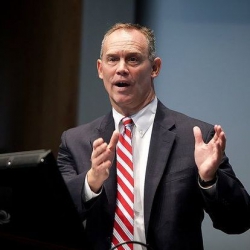
House Speaker Mike Turzai (pictured) wants to borrow $1.5 billion, while Gov. Tom Wolf wants to raise taxes.
The Pennsylvania State Legislature has been on the verge of legalizing online gambling all summer, but now it appears lawmakers will push an omnibus gambling bill to the fall. Legislators have turned to expanded gambling as a way to make up a $2.2 billion budget deficit.
Those familiar with negotiations do not dismiss entirely the idea of an omnibus gambling bill passing in the next few days. If not, then Pennsylvania’s summer legislative session is going to end without an agreement. The legislature is in session on Wednesday and Thursday.
The Pennsylvania Senate might pass a gambling bill which includes online casinos, online poker rooms, daily fantasy sports, and mobile tablet gambling in airport terminals. The bill also might contain provisions for 10 satellite casinos.
Mike Turzai’s 2017 Budget Plan
If the Senate passed a bill, that would leave the fate of online gambling in the hands of the House Republicans.
House Speaker Mike Turzai held a weekend session to discuss House Bill 271, but a clause which would pay down the deficit with a $1.5 billion bill is unpopular with Gov. Tom Wolf (D) and Senate Majority Leader Jake Corman (R).
Due to the complicated nature of the negotiations, the Speaker Turzai would be likely to delay a vote in the House until September. Speaker Turzai and Gov. Wolf not only are having an ideological battle over whether to pay the bills by borrowing money (Turzai) or raising taxes (Wolf), but it is increasingly seen as a political battle. Turzai plans to challenge Wolf for the governorship in 2018.
Pennsylvania has been tantalizingly close to passing an online gambling bill throughout 2017. The last two sessions, the legislature has included online gambling in drafts of a budget. Online gambling is expected to raise $120 million in its first year of implementation, while raising as much as $450 million a year in its fifth year of operation. Estimates for daily fantasy sports revenues are thought to be in the $5 million range.
Sin Taxes: Expanded Gambling and Alcohol
Under the House and Senate bills, expanded gambling would be paired with expanded alcohol sales to generate about $700 million in revenues. While various lawmakers have quibbled about “sin taxes”, the most controversial part of the budget is the remaining $1.5 billion in debts.
Democrats and moderate Republicans want to impose a severance tax on the Marcus shale reservoir. Conservative Republicans are opposed to any tax on Marcus shale, because it might damage the nation’s second-largest oil economy. Mike Turzai in particular is leading a “No New Taxes” group in the House.
Robert Tomlinson Calls for Income Tax Increase
State Senate Robert M. Tomlinson, a Republican, has called for a third way. Senator Tomlinson believes raising the state income tax would be the best idea, because state income taxes are tax-deductible on federal income taxes, under IRS rules.
Tomlinson said of his proposal, “I think the fairest and easier tax to do is the personal income tax.”
Critics of Speaker Mike Turzai’s plan to borrow $1.5 billion — a group of critics which includes Gov. Tom Wolf and Senate Leader Jake Corman — say that adding to the debt increases the chance that financial groups will downgrade Pennsylvania’s credit rating. Adding to the debt would increase the costs of paying back what is borrowed.
John Taylor Cannot Figure GOP Leader’s Plan
State Rep. John Taylor, a Republican in Turzai’s own caucus, spoke to Philly.com earlier this week about Turzai’s dilemma.
Senator Taylor said, “I think he’s in a box now. I don’t know what the endgame is. But if I were him, I wouldn’t take this all-or-nothing approach. It’s like they’re ignoring the fact that they have to have [the governor’s] agreement on this.”
Taylor added, “The only answer I can come up with is that he can at least show that he pulled out all the stops….But for all I know, he may really believe he can do this.”
Given the high stakes and the three-way impasse at the moment, the likeliest scenario is to put off an agreement until September or later. Delay would do less damage to the state’s credit rating than an ill-conceived agreement, so that appears to be the likely scenario for Pennsylvania’s online gambling bill for the moment.
